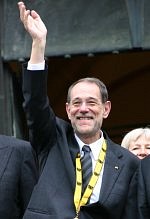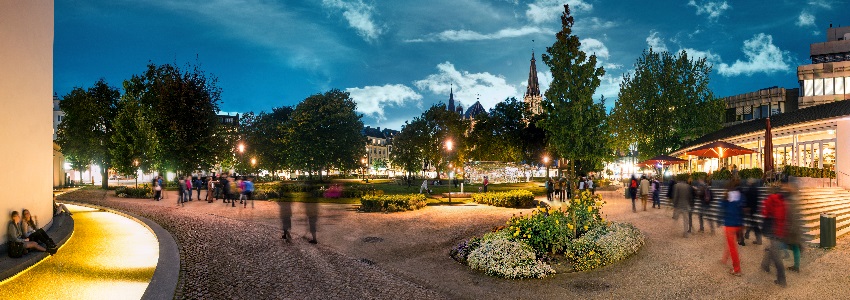Citation of the Board of Directors of the Society for the Conferring of the International Charlemagne Prize of Aachen
In Honour of The High Representative of the Common Foreign and Security Policy and Secretary General of the Council of the European Union Dr. Javier Solana Madariaga
 The project called "Europe" is legitimated in historico-political terms by its mandate permanently to safeguard peace in freedom and to ensure the economic welfare and social security of its citizens. United Europe offers to the younger generation opportunities that the older generations, which had to endure two world wars, dared not dream of. But the numerous conflicts confronting us every day make clear that new dangers and risks loom – risks which are far more complex and diverse than suggested by their foreshortening to a putative "clash of civilizations", and whose transnational impact can strike anyone and everyone. If the world order of the 21st century is to be an order of peace and freedom, the European Union cannot be an achievement limited to Europe alone; it has a global task.
The project called "Europe" is legitimated in historico-political terms by its mandate permanently to safeguard peace in freedom and to ensure the economic welfare and social security of its citizens. United Europe offers to the younger generation opportunities that the older generations, which had to endure two world wars, dared not dream of. But the numerous conflicts confronting us every day make clear that new dangers and risks loom – risks which are far more complex and diverse than suggested by their foreshortening to a putative "clash of civilizations", and whose transnational impact can strike anyone and everyone. If the world order of the 21st century is to be an order of peace and freedom, the European Union cannot be an achievement limited to Europe alone; it has a global task.
United Europe therefore cannot afford to do without a community foreign and security policy. For only in the framework of community action can the preservation of common values and basic interests, the independence and the intactness of the European Union be ensured. And only in the framework of common action can Europe do true justice to its responsibility to settle existing imbalances and to foster peace in the world.
Mindful of this eminent objective which, six decades after the end of the Second World War, continues today to be both topical and urgent, and in recognition of his outstanding active commitment to a substantial European contribution to a safer and more just world, the Board of Directors of the Society for the Conferring of the International Charlemagne Prize of Aachen honours in the year 2007 the High Representative for the Common Foreign and Security Policy and Secretary General of the Council of the European Union, Dr. Javier Solana Madariaga.
The European Union is a global trade and economic power and, with some 450 million consumers, the domestic market with the greatest buying power in the world. The Community and its member states account for over 50 percent of all public development aid. Nonetheless the Union can ill afford to settle permanently for the role of economic giant; rather, it is above all as a Political Union that it must speak with one voice.
Important as the economic and monetary integration of our continent has been and will continue to be, the stability of Europe is primarily determined by foreign and security policy. It is therefore indispensable for the Union to be firmer than it has been in the past in calling to mind its common responsibility; for the Europeans have a major contribution to make to
- preserving the peace,
- observing human rights and basic liberties,
- strengthening international security,
- fostering international cooperation and
- developing and strengthening democracy and the rule of law.
With its choice of Javier Solana, the European Union has entrusted one of the most experienced and important makers of foreign and security policy with the formulation and coordination of a common policy of this kind; and it behoves all governments of the member states as well as the citizens in United Europe to join wholeheartedly in supporting him in this task, which will likewise generate meaning and purpose within the community.
Javier Solana Madariaga, who is married and the father of two children, was born in Madrid on 14 July 1942, growing up in a family of liberal-democratic persuasion. His father was a professor of chemistry, his mother a niece of the writer Salvador de Madariaga. After attending El Pilar, an elite private school, Solana began to study physics at the Madrid Complutense University; owing to his participation in protests against the Franco dictatorship his matriculation was cancelled and he had to continue his studies in the Netherlands, Great Britain and the United States, in 1968 earning a doctorate in physics in the USA. After working at the University of Virginia he returned in 1971 to Spain and taught physics at the Madrid Autonomous University until one of Franco’s last education ministers terminated his contract for political reasons. It was not until 1975 that he again got a science appointment – professor of physics at his alma mater, the Complutense University.
Politically he had already made a name for himself by this time. Having joined the Spanish Socialist Party (PSOE) as a student, Solana for many years headed the PSEO in the district of Madrid. The capital’s citizens first voted him into Parliament in 1977. At the inauguration of the Socialist government under Felipe González he was appointed Minister of Culture in 1982 (from 1985 serving as Government Spokesman at the same time). In 1988 he moved to the Education and Science Ministry. In July 1992, González appointed him Foreign Minister.
Cosmopolitan, knowledgeable, tough, persevering, but also conciliatory and suave in manner, Solana became a widely respected and successful diplomat. Special praise was voiced for his leadership during the Spanish EU presidency in the second half of 1995, when he helped to launch the Euro-Mediterranean partnership, later known as the "Barcelona process". It was thus hardly surprising that Solana, in younger years an emphatic critic of NATO, received widespread support for his candidacy for the office of NATO Secretary General. He was officially and unanimously elected by the members of the Atlantic Alliance in Brussels on 5 December 1995, taking up his post some days later on 18 December 1995.
Solana’s activities focused from the outset on realigning the North Atlantic Pact towards eastern Europe. Of major importance in this connection was the security agreement between NATO and Russia, which Solana achieved after months of negotiations and which became the foundation of extensive disarmament measures. The membership negotiations with Poland, the Czech Republic and Hungary, widely seen as also setting an example for the European Union and its enlargement process, were successfully concluded on 27 November 1997; the accession of the new members to the Alliance followed in April 1999.
At the EU’s Cologne summit at the beginning of June 1999 the heads of government of the EU states named Solana Secretary General of the Council and the first "High Representative for the Common Foreign and Security Policy" (CFSP, Ger. GASP) – before the end of his term of office as NATO Secretary General. In so doing, they were purposely committing themselves; for the person who was to formulate, coordinate and visibly present Community policy in this existentially vital field was vested from the outset with the authority of a partner, not that of a compliant civil servant. On 18 October of the same year, the Spaniard took up his new post. The ambassadors of the WEU states, aiming to move the military organization into the Community as soon as possible, additionally named Solana Secretary General of the West European Union.
Often attracting scanty public notice, Javier Solana, also known as "Mr. GASP", has since then embodied the efforts of the EU to speak with one voice in central matters of foreign and security policy – in the trouble spots of former Yugoslavia, in Chechnya and in the Middle East, on the African continent, in the Philippines and in the Ukraine – while functioning as the main driving force of a European security and defence policy emphasizing above all the non-military aspects of crisis management. "Whenever and wherever in the world there is a flare-up, Solana hastens onto the diplomatic stage and Europe’s voice is clearly heard" ("Süddeutsche Zeitung", 14 June 2001).
The swift transfer of the WEU to the European Union, the design (developed with breaktaking speed) for a European Rapid Reaction Force, and the successes achieved on the way to a solid postwar order in the Balkans – without Solana’s persevering efforts these things might well not have materialized, any more than the EU’s first international crisis-management operations and the new European security strategy.
The great esteem in which Javier Solana is held became clear once more on 29 June 2004 when the heads of state and government of the EU member states re-elected him to serve another five-year term as Secretary General of the European Council and as High Representative for the Common Foreign and Security Policy. In addition it was decided that with the entry into force of the European Constitutional Treaty, he would be the first foreign minister of the European Union, responsible for the coherence of the external activities of all EU bodies.
By virtue of his impressive personal record and the eminent policy-shaping task he has assumed as High Representative for the Common Foreign and Security Policy, Dr. Javier Solana Madariaga has become a beacon of hope for the deepening of the political dimension of Europe, the Euro-Atlantic partnership and the European Union’s declared purpose to render a key contribution to world peace by means of community action based on common values and convictions. In honouring "Mr. GASP" in the year 2007, the Board of Directors of the Society for the Conferring of the International Charlemagne Prize of Aachen also expressly appeals to the member states of the EU to attach even more importance in future to the common foreign and security policy as a central and purpose-endowing component of the house of Europe.
Charlemagne Prize 17 May 2007




